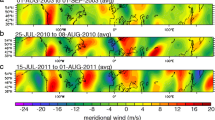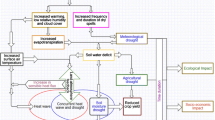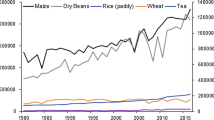Abstract
This study aimed to evaluate the change in the air temperature and the impacts of heat waves using Climate Change Indexes on the physiological and productive responses of lactating Holstein cows. Daily data of maximum and minimum air temperature for 1981–2021 were used. Heat waves were determined using six Climate Change Indexes. Individual data on respiratory rate, rectal temperature, and milk yield were collected in the summers of 2018, 2019, and 2021. The temperature trend analysis showed a significant (p < 0.0001) increase in maximum temperature, minimum temperature, and days in a heat wave. All six indexes increased significantly (p > 0.01). The increase in warm nights (> 20 °C) and the hottest days (> 35 °C) was the highest since 2010. Heat waves were classified into short (< 5 days) and long (> 5 days) of greater (> 36 °C) or lesser (< 36 °C) intensity. During the long and short heat waves of greater intensity, the respiratory rate increased (p < 0.05) until the fourth day. On the other hand, rectal temperature was higher (p < 0.05) from the fourth day until the end of the long heat waves. Therefore, the decrease in milk yield was significantly greater from the fourth or fifth day onwards. Finally, the evaluation method based on indexes was efficient to demonstrate the negative effects on physiological parameters and milk yield and can be indicated to evaluate heat stress in lactating cows.



Similar content being viewed by others
References
Avendaño-Reyes L, Correa-Calderón A, Macías-Cruz U, García-Casillas AC, Mellado M, Robinson PH, Hernández-Rivera JÁ (2021) Impacts on two dairy breeds of adding a third (night) cooling event under extreme ambient heat. Int J Biometeorol 65:1443–1450. https://doi.org/10.1007/s00484-021-021115-y
Baruselli PS, Ferreira RM, Vieira LM, Souza AH, Bó GA, Rodrigues CA (2020) Use of embryo transfer to alleviate infertility caused by heat stress. Theriogenology 155:1–11. https://doi.org/10.1016/j.theriogenology.2020.04.028
Berman A, Folman Y, Kaim M, Mamen M, Herz Z, Wolfenson D, Arieli A, Graber Y (1985) Upper critical temperatures and forced ventilation effects for high-yielding dairy cows in a subtropical climate. J Dairy Sci 68(6):1488–1495. https://doi.org/10.3168/jds.S0022-0302(85)80987-5
Bitencourt DP, Fuentes MV, Franke AE, Silveira RB, Alves MP (2020) The climatology of cold and heat waves in Brazil from 1961 to 2016. Int J Climatol 40(4):2464–2478. https://doi.org/10.1002/joc.6345
Claessens L, Antle JM, Stoorvogel JJ, Valdivia RO, Thornton PK, Herrero M (2012) A method for evaluating climate change adaptation strategies for small-scale farmers using survey, experimental and modeled data. Agric Syst 111:85–95. https://doi.org/10.1016/j.agsy.2012.05.003
Collier RJ, Baumgard LH, Zimbelman RB, Xiao Y (2019) Heat stress: physiology of acclimation and adaptation. Anim Front 9(1):12–19. https://doi.org/10.1093/af/vfy031
Costa RL, Baptista GMM, Gomes HB, Silva FDS, da Rocha Júnior RL, Salvador MA, Herdies DL (2020) Analysis of climate extremes indices over northeast Brazil from 1961 to 2014. Weather Clim Extrem 28:100254. https://doi.org/10.1016/j.wace.2020.100254
da Costa ANL, Feitosa JV, Júnior PAM, de Souza PT, de Araújo AA (2015) Hormonal profiles, physiological parameters, and productive and reproductive performances of Girolando cows in the state of Ceará-Brazil. Int J Biometeorol 59(2):231–236. https://doi.org/10.1007/s00484-014-0838-0
Daltro DDS, Fischer V, Alfonzo EPM, Dalcin VC, Stumpf MT, Kolling GJ, da Silva MVGB, McManus C (2017) Infrared thermography as a method for evaluating the heat tolerance in dairy cows. Rev Bras De Zootec 46:374–383. https://doi.org/10.1590/S1806-92902017000500002
Dikmen S, Hansen PJ (2009) Is the temperature-humidity index the best indicator of heat stress in lactating dairy cows in a subtropical environment? J Dairy Sci 92(1):109–116. https://doi.org/10.3168/jds.2008-1370
Dikmen S, Larson CC, De Vries A, Hansen PJ (2020) Effectiveness of tunnel ventilation as dairy cow housing in hot climates: rectal temperatures during heat stress and seasonal variation in milk yield. Trop Anim Health Prod 52(5):2687–2693. https://doi.org/10.1007/s11250-020-02309-3
Ferrazza RA, Garcia HDM, Aristizábal VHV, Nogueira CS, Veríssimo CJ, Sartori JR, Sartori R, Ferreira JCP (2017) Thermoregulatory responses of Holstein cows exposed to experimentally induced heat stress. J Therm Biol 66:68–80. https://doi.org/10.1016/j.jtherbio.2017.03.014
Fodor N, Foskolos A, Topp CF, Moorby JM, Pásztor L, Foyer CH (2018) Spatially explicit estimation of heat stress-related impacts of climate change on the milk production of dairy cows in the United Kingdom. PLoS ONE 13(5):e0197076. https://doi.org/10.1371/journal.pone.019707
Garcia AB, Angeli N, Machado L, Cardoso FC, Gonzalez F (2015) Relationships between heat stress and metabolic and milk parameters in dairy cows in Southern Brazil. Trop Anim Health Prod 47:889–894. https://doi.org/10.1007/s11250-015-0804-9
Garner JB, Douglas M, Williams SRO, Wales WJ, Marett LC, DiGiacomo K, Leury BJ, Hayes BJ (2017) Responses of dairy cows to short-term heat stress in controlled-climate chambers. Anim Prod Sci 57(7):1233–1241. https://doi.org/10.1071/AN16472
Guo Y, Gasparrini A, Li S, Sera F, Vicedo-Cabrera AM, Coelho MSZS, Tong S (2018) Quantifying excess deaths related to heat waves under climate change scenarios: a multicountry time series modelling study. PLoS Med 15(7):e1002629. https://doi.org/10.1371/journal.pmed.1002629
Harrison MT, Cullen BR, Armstrong D (2017) Management options for dairy farms under climate change: effects of intensification, adaptation and simplification on pastures, milk production and profitability. Agric Syst 155:19–32. https://doi.org/10.1016/j.agsy.2017.04.003
IPCC (2021) Future global climate: scenario-based projections and near term information. In Climate Change 2021: The Physical Science Basis. Contribution of Working Group I to the Sixth Assessment Report of the Intergovernmental Panel on Climate Change. Cambridge University Press, 553–672
Kalaugher E, Beukes P, Bornman JF, Clark A, Campbell DI (2017) Modelling farm-level adaptation of temperate, pasture-based dairy farms to climate change. Agric Syst 153:53–68. https://doi.org/10.1016/j.agsy.2017.01.008
Marinho KFS, Andrade LDMB, Spyrides MHC, Silva CMS, de Oliveira CP, Bezerra BG, Mutti PR (2020) Climate Profiles in Brazilian Microregions. Atmosphere 11(11):1217. https://doi.org/10.3390/atmos11111217
Martello LS, Junior HS, Silva SL, Balieiro JCC (2010) Alternative body sites for heat stress measurement in milking cows under tropical conditions and their relationship to the thermal discomfort of the animals. Int J Biometeorol 54:647–652. https://doi.org/10.1007/s00484-009-0268-6
Marzouk OA (2021) Assessment of global warming in Al Buraimi, sultanate of Oman based on statistical analysis of NASA POWER data over 39 years, and testing the reliability of NASA POWER against meteorological measurements. Heliyon 7(3):e06625. https://doi.org/10.1016/j.heliyon.2021.e06625
Mbuthia JM, Mayer M, Reinsch N (2021) Modeling heat stress effects on dairy cattle milk production in a tropical environment using test-day records and random regression models. Animal 15(8):100222. https://doi.org/10.1016/j.animal.2021.1002222
Monteiro LA, Sentelhas PC, Pedra GU (2018) Assessment of NASA/POWER satellite-based weather system for Brazilian conditions and its impact on sugarcane yield simulation. Int J Climatol 38(3):1571–1581. https://doi.org/10.1002/joc.52822
Negri R, Aguilar I, Feltes GL, Cobuci JA (2021) Selection for test-day milk yield and thermotolerance in Brazilian Holstein cattle. Animals 11(1):128. https://doi.org/10.3390/ani11010128
Pacheco VM, de Sousa RV, da Silva Rodrigues AV, de Souza Sardinha EJ, Martello LS (2020) Thermal imaging combined with predictive machine learning based model for the development of thermal stress level classifiers. Livest Prod Sci 241:104244. https://doi.org/10.1016/j.livsci.2020.104244
Parente L, Mesquita V, Miziara F, Baumann L, Ferreira L (2019) Assessing the pasturelands and livestock dynamics in Brazil, from 1985 to 2017: a novel approach based on high spatial resolution imagery and Google Earth Engine cloud computing. Remote Sens Environ 232:111301. https://doi.org/10.1016/j.rse.2019.1113011
Perkins SE, Alexander LV (2013) On the measurement of heat waves. J Clim 26(13):4500–4517. https://doi.org/10.1175/JCLI-D-12-00383.1
Rhoads ML, Rhoads RP, VanBaale MJ, Collier RJ, Sanders SR, Weber WJ, Crooker BA, Baumgard LH (2009) Effects of heat stress and plane of nutrition on lactating Holstein cows: I Production, metabolism, and aspects of circulating somatotropin. J Dairy Sci 92(5):1986–1997. https://doi.org/10.3168/jds.2008-1641
Russo S, Dosio A, Graversen RG, Sillmann J, Carrao H, Dunbar MB, Singletin A, Montagna P, Barcola P, Vogt JV (2014) Magnitude of extreme heat waves in present climate and their projection in a warming world. J Geophys Res Atmos 119(22):12500–12512. https://doi.org/10.1002/2014JD022098
Salviano MF, Groppo JD, Pellegrino GQ (2016) Trends analysis of precipitation and temperature data in Brazil. Rev Bras Meteorol 31(1):64–73. https://doi.org/10.1590/0102-778620150003
Santana ML, Bignardi AB, Pereira RJ, Menéndez-Buxadera A, El Faro L (2016) Random regression models to account for the effect of genotype by environment interaction due to heat stress on the milk yield of Holstein cows under tropical conditions. J Appl Genet 57(1):119–127. https://doi.org/10.1007/s13353-015-0301-x
Santana ML, Bignardi AB, Pereira RJ, Stefani G, El Faro L (2017) Genetics of heat tolerance for milk yield and quality in Holsteins. Animal 11(1):4–14. https://doi.org/10.1017/S1751731116001725
Spiers DE, Spain JN, Sampson JD, Rhoads RP (2004) Use of physiological parameters to predict milk yield and feed intake in heat-stressed dairy cows. J Therm Biol 29(7–8):759–764. https://doi.org/10.1016/j.jtherbio.2004.08.051
Spiers DE, Spain JN, Ellersieck MR, Lucy MC (2018) Strategic application of convective cooling to maximize the thermal gradient and reduce heat stress response in dairy cows. J Dairy Sci 101(9):8269–8283. https://doi.org/10.3168/jds.2017-14283
Tramontini RDCM, Bánkuti FI, Pozza MSS, Massuda EM, Damasceno JC, Dias AM, Ítavo BF, Ítavo LCV, Santos GT (2021) Typology of dairy production systems based on management strategies in Paraná State. Brazil Trop Anim Sci J 44(1):123–130. https://doi.org/10.5398/tasj.2021.44.1.123
Vitali A, Felici A, Esposito S, Bernabucci U, Bertocchi L, Maresca C, Nardone A, Lacetera N (2015) The effect of heat waves on dairy cow mortality. J Dairy Sci 98(7):4572–4579. https://doi.org/10.3168/jds.2015-9331
West JW (2003) Effects of heat-stress on production in dairy cattle. J Dairy Sci 86(6):2131–2144. https://doi.org/10.3168/jds.S0022-0302(03)73803-X
Xavier AC, King CW, Scanlon BR (2016) Daily gridded meteorological variables in Brazil (1980–2013). Int J Climatol 36(6):2644–2659. https://doi.org/10.1002/joc.4518
Zhang X, Yang F (2004) RClimDex (1.0) user manual. Climate Research Branch, Environment Canada, Ontario, p 22
Funding
This study was financed in part by the Coordenação de Aperfeiçoamento de Pessoal de Nível Superior – Brasil (CAPES)—Finance Code 001.
Author information
Authors and Affiliations
Corresponding author
Ethics declarations
Ethics approval
All procedures performed in studies involving animals were in accordance with the current Federal Law n° 11.794, sanctioned by the President of the Republic on November 8, 2008. The law is available in full at http://planalto.gov.br/ccivil_03/_Ato2007-2010/2008/Lei/L11794.htm and is known as Arouca Law, which regulates the scientific use of animals in Brazil. The Ethic Committee on Animal Use of the School of Animal Science and Food Engineering of São Paulo University protocol number CEUA 4859201219 approved the experimental procedures.
Conflict of interest
The authors declare no competing interests.
Rights and permissions
Springer Nature or its licensor holds exclusive rights to this article under a publishing agreement with the author(s) or other rightsholder(s); author self-archiving of the accepted manuscript version of this article is solely governed by the terms of such publishing agreement and applicable law.
About this article
Cite this article
Manica, E., Coltri, P.P., Pacheco, V.M. et al. Changes in the pattern of heat waves and the impacts on Holstein cows in a subtropical region. Int J Biometeorol 66, 2477–2488 (2022). https://doi.org/10.1007/s00484-022-02374-3
Received:
Revised:
Accepted:
Published:
Issue Date:
DOI: https://doi.org/10.1007/s00484-022-02374-3




